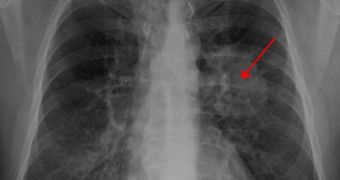A group of researchers at Biothera Inc., led by senior vice president and medical director Richard D. Huhn, PhD, announces the development of a new way to address the advanced stages of lung cancer.
The method was detailed in a presentation held in San Diego, California, at the Joint Conference on the Molecular Origins of Lung Cancer. The meeting was organized by the American Association for Cancer Research (AACR) and the International Association for the Study of Lung Cancer (IASLC).
Researchers conducted a phase II clinical trial on lung cancer patients in the advanced stages of the disease, where they treated test subjects with the immunotherapy Imprime PGG. This medication was used in association with antibody therapy and chemotherapy, which are standard treatments.
The Biothera team reports that using Imprime PGG led to significant improvements in responses to treatment for most patients in the group. Additionally, survival rates were also boosted by a wide margin. The tests were conducted on people suffering from non-small cell lung cancer (NSCLC).
Experts selected a group of participants from hospital patients with stage 3b or stage 4 cancers. Sixty patients received the drug cetuximab, plus Imprime PGG, on days 1, 8 and 15 of the study. The other 30 participants only received the antibody drug cetuximab.
Both groups of patients in the 21-day research received carboplatin and paclitaxel throughout the investigation. These are standard chemotherapy drugs used to fight this form of lung cancer.
“Imprime PGG is an immunotherapy that capitalizes on a natural defense mechanism in our bodies through which immune cells called neutrophils and monocytes recognize and kill infectious organisms,” Huhn explains.
“When combined with an antitumor monoclonal antibody, Imprime PGG redirects neutrophils and monocytes to recognize and kill antibody-targeted cancer cells,” he said at the conference.
The drug works by binding to a specific receptor site on neutrophils, allowing the latter to become strong enough to successfully attack and destroy cancer cells. Imprime PGG is based on a molecule extracted from yeast, called beta 1,3/1,6 glucan.
“Imprime PGG works most effectively in people whose natural antibeta glucan antibody levels exceed a certain threshold. The more antibodies present to bind Imprime PGG to neutrophils and monocytes, the higher the number of these immune cells that are activated to recognize and kill cancer,” Huhn concluded.

 14 DAY TRIAL //
14 DAY TRIAL //